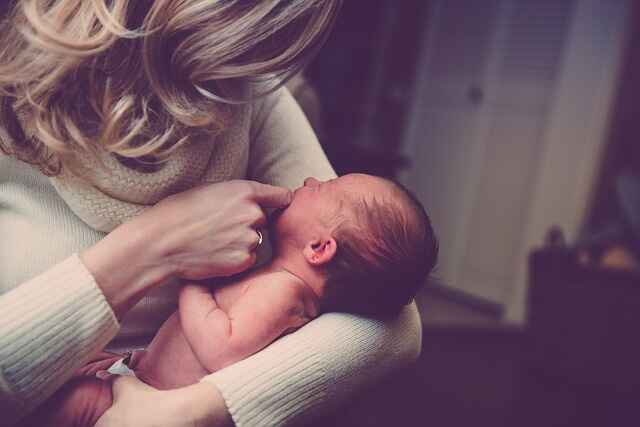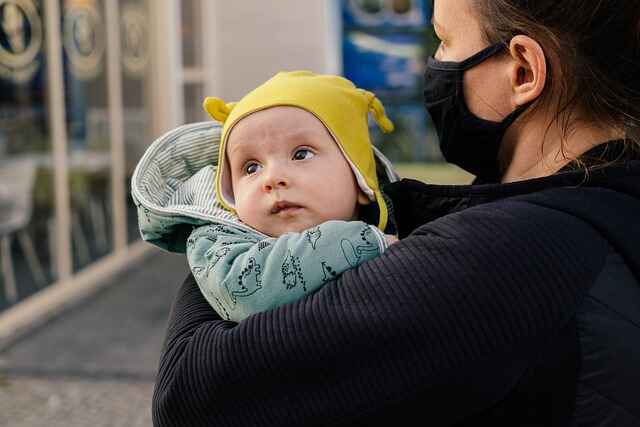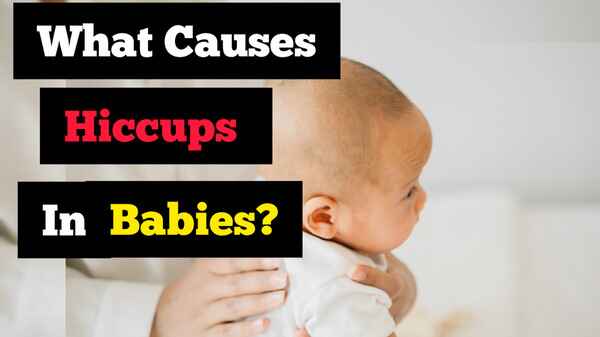Being a parent to a newborn can be an overwhelming experience filled with joy, love, and constant worry. Taking care of a little one involves more than just feeding, changing diapers, and putting them to bed. Every small behavior and sound of your baby can make you question and second-guess yourself. One common concern that many parents have is about their baby’s hiccups. (Source)
Also, Read Virtual Autism: A New Threat in Children Aged 0 to 3 Years
Why do babies hiccup so often? Are frequent hiccups normal? And most importantly, how can you make them stop?
It occurs when the diaphragm muscles involuntarily contract causing the vocal cords to close and produce the characteristic “hic” sound. Even before birth, babies hiccup in the womb. It starts around halfway through pregnancy and can even be felt by the mother as tiny spasms or jolts. Hiccups in babies are very common during the first year of life, with newborns spending up to 2.5% of their day hiccupping. So, if your baby is hiccupping frequently, rest assured that you are not alone in this experience. The exact causes of hiccups in babies are not fully understood, but there are several factors that can contribute to their occurrence.

Let us have a look at some of the causes of hiccups in babies:
1. Eating too fast:
Just like in adults, babies can hiccup if they eat too quickly. This can happen with a fast-flow nipple on a bottle or due to forceful let-down during breastfeeding. Overfeeding or giving large meals to babies starting solids can also lead to hiccups.
2. Needing to burp:
It may be the baby’s way of trying to clear excess air from their stomach. Sometimes, babies may need assistance in burping to release the trapped air.
3. Swallowing air:
Babies can swallow excess air during feeding, especially if they are sucking on an empty bottle nipple or not latching properly during breastfeeding.
4. Overfeeding:
Feeding a baby too much at once can result in hiccups. It is recommended to allow the baby to dictate their feeding amount and avoid following a strict schedule.
5. Gastroesophageal reflux:
Hiccupping, along with burping and spitting up, can be a sign of gastroesophageal reflux, a common condition in babies where stomach acid regurgitates, causing discomfort.
To stop your baby’s hiccups, there are a few strategies you can try:
1. Burp your baby:
Gently patting your baby’s back or rubbing their abdomen can help release trapped air and relieve hiccups.
2. Be mindful of feeding:
Avoid overfeeding your baby and take breaks during feeding to allow them to burp. If bottle feeding, choose a nipple that controls the flow and prevents the baby from sucking on an empty nipple. If breastfeeding, ensure a proper latch and consider leaning back to decrease milk flow.
3. Hold your baby upright:
After feeding, hold your baby upright for a few minutes to aid digestion and reduce it, burping, and another digestive discomfort.

4. Offer a pacifier:
Non-nutritive sucking on a pacifier can relax the diaphragm and alleviate it. Comfort nursing can have a similar effect.
5. Address gastroesophageal reflux:
If you suspect your baby has reflux, consult a doctor who may recommend lifestyle and feeding changes. In some cases, medication may be prescribed.
While most cases of baby hiccups are harmless and resolve on their own, if your baby appears uncomfortable or experiences other symptoms like excessive crying, spitting up or belching, it is essential to seek guidance from a healthcare professional. They can provide a proper diagnosis and suggest appropriate treatments if necessary.
It is important to remember that every baby is unique, and what works for one may not work for another. Trust your instincts as a parent and reach out to your baby’s doctor if you have concerns about their hiccups or overall well-being.
Also, Read How to Boost Your Baby’s Brain Development
Here are some facts related to newborn hiccups:
- Hiccups in babies are caused by involuntary contractions of the diaphragm muscles.
- Babies hiccup frequently in the womb, with the reflex developing around halfway through pregnancy.
- Hiccups can be seen on ultrasound exams during pregnancy.
- Newborns can spend up to 2.5% of their day hiccupping.
- Hiccups in babies are usually harmless and decrease in frequency as they grow.
- Eating too fast can cause hiccups in babies, whether through bottle feeding or breastfeeding.
- Burping can help relieve hiccups by clearing excess air from the stomach.
- Swallowing air during feeding can contribute to hiccups in babies.
- Overfeeding can lead to it in infants.
- Gastroesophageal reflux can cause hiccups, along with other symptoms like spitting up and belching.
- Frequent hiccups accompanied by discomfort or interference with feeding or sleep may require attention.
- Burping the baby by applying gentle pressure on the abdomen can help alleviate hiccups.
- Taking breaks during feeding and holding the baby upright afterward can aid digestion and reduce hiccups.
- Offering a pacifier or allowing non-nutritive suckling can relax the diaphragm and relieve hiccups.
- Gripe water and other similar products are not FDA-regulated and should be used under medical supervision.
- Gastroesophageal reflux can be diagnosed based on symptoms and may require lifestyle and feeding changes.
- Milk-soy protein intolerance (MSPI) can cause hiccups, spitting up, or gas in babies.
- It is essential to trust your instincts as a parent and consult your baby’s doctor if you have concerns about their hiccups or overall well-being.
- Rarely, it may interfere with a baby’s breathing, necessitating immediate medical attention.
These were the causes of hiccups and some strategies to cope with them!





